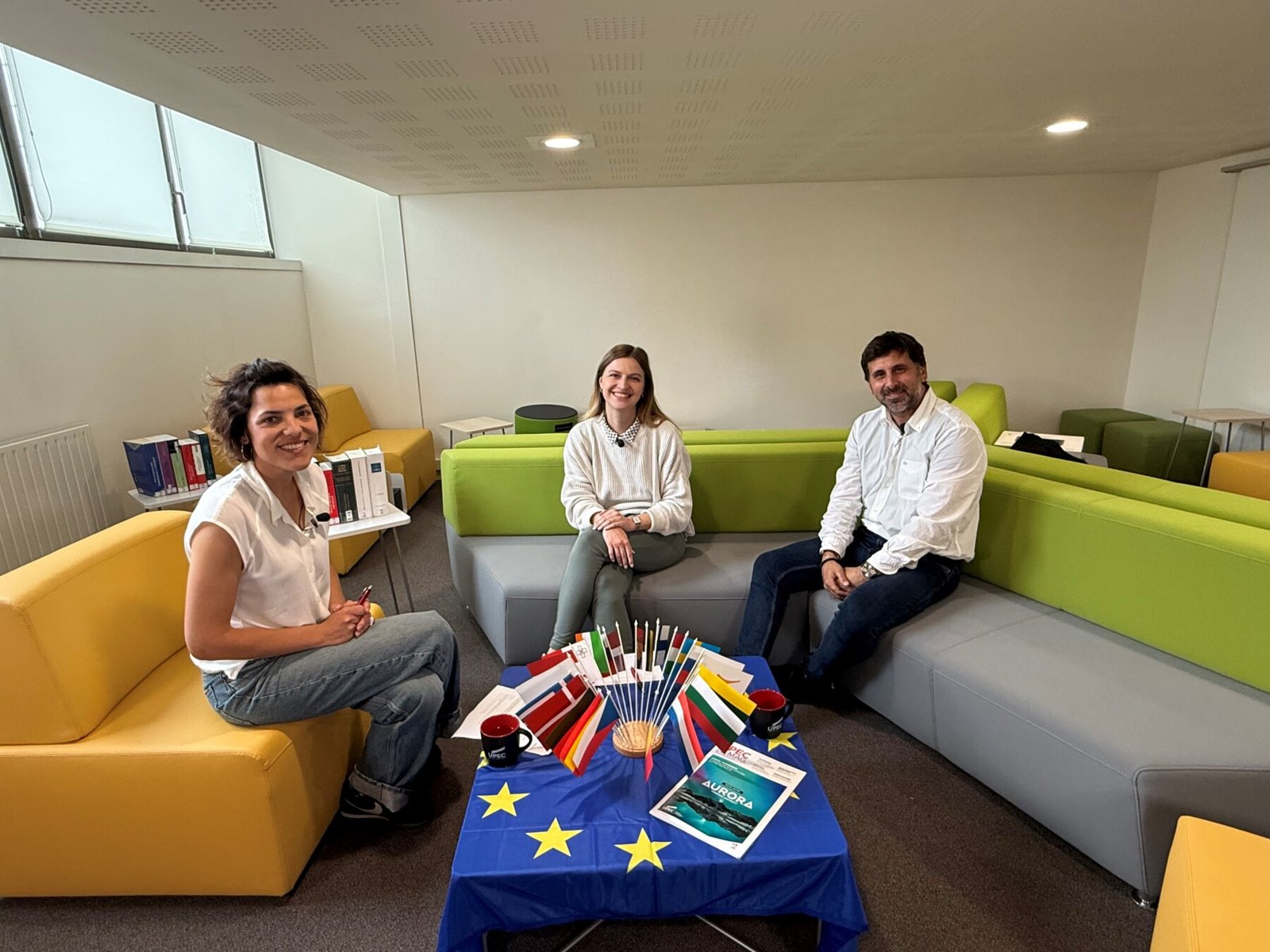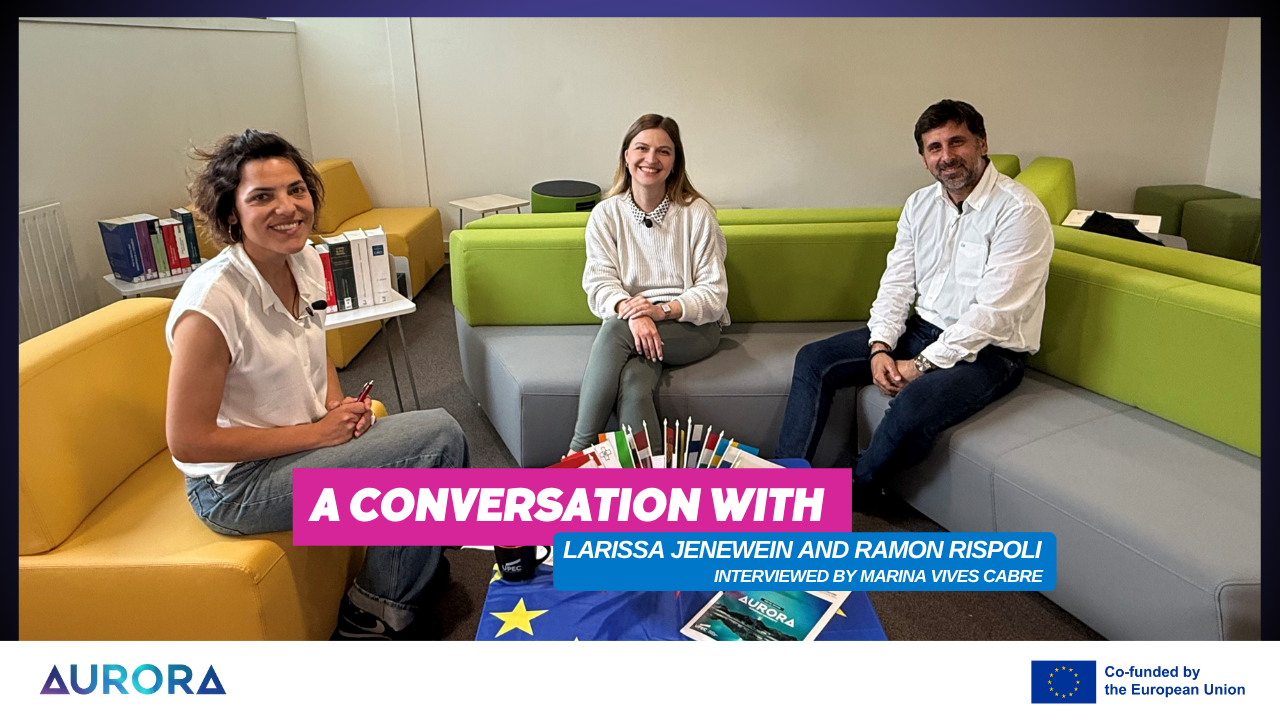A Conversation With Larissa Jenewein and Ramon Rispoli: Continuous Learning and Internationalisation in a Changing World

Today, internationalisation in higher education extends far beyond the classical models of mobility. In this Aurora conversation, Marina Vives Cabré speaks with Larissa Jenewein and Ramon Rispoli about how blended opportunities, transdisciplinarity, and co-creation are shaping the future of continuous learning in Europe’s universities.

This discussion was led by Marina Vives Cabré, Internationalisation Projects Officer at the Universitat Rovira i Virgili and Lead for the Aurora 2030 Work Package 8 Enabling Mobility and Exchange. She interviewed Larissa Jenewein, Institutional Erasmus+ Coordinator at Universität Innsbruck, and Ramon Rispoli, Associate Professor of Design, Università Federico II of Naples.
Moving Beyond Traditional Models – Beyond the Classical Perspective
For many years, internationalisation in the European context meant long-term Erasmus exchanges, the use of English and English-language training, and physical mobility. But as Vives notes, internationalisation today must be understood as an institutional intentional and ongoing strategy, one that responds to society’s evolving challenges and students’ and professionals’ requests.
This shift is most evident in the rise of Blended Intensive Programmes (BIPs), short-term mobilities, and virtual exchanges.
Larissa: It gives us so much more space to include target groups who were excluded before in the Erasmus Programme. They were not really (represented) in their scheme, so I think that was actually the original idea of the European Commission to have some alternatives for the people who are not able to do a long-term mobility – like a typical classical semester mobility as we all know – because of so many reasons: health issues, a disability, because of caretaking duties, because they have to work. But now we are at the point where it goes even beyond addressing underrepresented target groups. Now it’s really central for the strategic perspective of institutions.
Inclusivity and Flexibility
For Rispoli, these innovations provide vital flexibility for both students and faculty members. In his own teaching, Rispoli has designed blended courses combining online theory with in-person workshops. His students—often already internationally mobile—benefit from these compact, impactful opportunities. At the same time, he and fellow academics gain the chance to collaborate across institutions without committing to months abroad.
Ramon: It’s especially good for Master students. With a short-term mobility like a Blended Intensive Programme (BIP), they avoid spending one semester out of four abroad, which would be a big deal.
Transdisciplinarity and Co-Creation
A recurring theme in the discussion is transdisciplinarity, and highlights the crucial distinction from interdisciplinarity. As Rispoli explains, BIPs open up new ways of designing courses.
Ramon: It’s almost impossible to build real transdisciplinarity within a traditional curriculum, while an intensive week of a BIP plus the online part really gives you the possibility of overcoming traditional disciplinary boundaries.
In interdisciplinarity, you put your expertise on the table. In transdisciplinarity, you build new knowledge by learning from others and questioning your own assumptions. BIPs make this possible by bringing together students from diverse fields—design, engineering, social sciences, medicine, and more.
Larissa: Co-creation enriches the experience even further. When we’re thinking about the BIPS for instance, it’s not only about the exchange of students or professors, but also about the co-creation process of the event, lecture or the seminar itself. So, you also gain intercultural skills, for example.
Transforming Institutions and Looking Ahead
Vives links this to the broader concept of comprehensive internationalisation, where governance, staff, academics, and students all play vital roles in creating more connected, flexible universities. For internationalisation to continue evolving, keywords like flexibility, boundary crossing, co-creation, and openness remain essential.
This conversation is part of a series called “A Conversation With…” undertaken within the framework of the Aurora 2030 programme supported by the European Commission. It is an interview format that focuses on a specific topic and is meant to inspire its readers to reflect on and catalyse positive impact. The exchange is available in its original format on the Aurora YouTube channel.